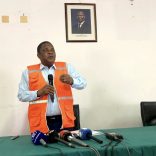Mozambique: 29 confirmed mpox cases, including the first in Maputo province
UNDP: Economic interventions more important than military in countering terrorism – Hanlon

Image: UNDP
Just a month before the October 2017 start of the Cabo Delgado insurgency, UNDP issued a prescient report which, in effect, predicted the course of the war. UNDP interviewed 495 voluntary recruits to African extremist organisations. It says the “research unequivocally underscores the relevance of economic factors as drivers of recruitment. The grievances associated with growing up in contexts where multidimensional poverty is high and far deeper than national averages, with the lived reality of unemployment and underemployment, render ‘economic factors’ a major source of frustration identified by those who joined violent extremist groups. … Employment is the single most frequently cited ‘immediate need’ faced at the time of joining.”
But the research also shows that there is a “tipping point” which pushes someone to join an extremist group. “A striking 71% pointed to ‘government action’, including ‘killing of a family member or friend’ or ‘arrest of a family member or friend’, as the incident that prompted them to join. … State security-actor conduct is revealed as a prominent accelerator of recruitment, rather than the reverse.” It stresses that security-driven responses are often “directly counter-productive” and governments should “reassess militarized responses”.
The study finds that “where there is injustice, deprivation and desperation, violent extremist ideologies present themselves as a challenge to the status quo and a form of escape.” Disaffection of government is very high, as is a “belief that government only looks after the interests of a few.”
This almost total distrust of government means that outside economic interventions will also not be trusted, and thus “initiatives must be spearheaded by trusted local actors.”
Published just before the start of the Cabo Delgado war, it serves as an accurate prediction of what has happened. The study is based on interviews with 495 voluntary recruits, primarily with Al-Shabaab in Somalia and Kenya and Boko Haram in Nigeria.
- The full report “Journey to Extremism in Africa” is HERE.
- A summary “Journey of young Africans into violent extremism marked by poverty and deprivation” is on
http://bit.ly/UNDP-Pov-Extreme
By Joseph Hanlon












Leave a Reply
Be the First to Comment!
You must be logged in to post a comment.
You must be logged in to post a comment.